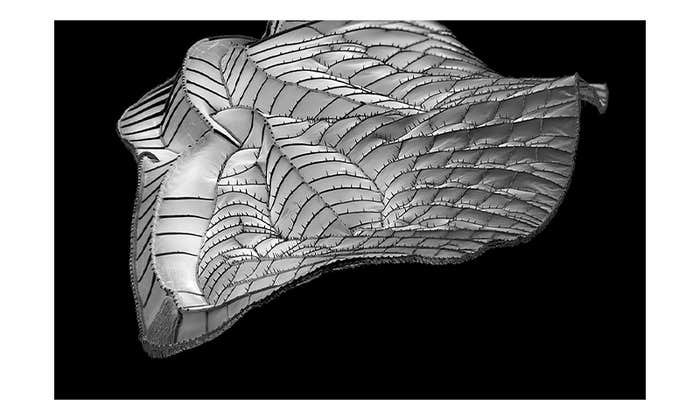The first time I saw a meteor, I’d slipped outside to lie in the grass after everyone else had gone to sleep. The daytime commotion of my cousins’ and siblings’ games and my Poppop’s blaring polka music often drove me to tears. As an introvert, I wanted nothing more than to escape the chaos of my childhood and let the quiet of the night sky comfort me.
I grew up in an economically depressed Pennsylvania coal town as the middle kid in a poor blue-collar family. My parents never read to me or talked about the stars; they were too busy working, my dad as a painter in a factory, and my mother as a short order cook. I spent most of my childhood reading anything I could get my hands on, which wasn’t much—tattered and incomplete set of encyclopedias, the odd science book from my school library, and ragged novels stuffed haphazardly on a shelf in the basement (the best ones were the science-fiction stories). For as long as I could remember, I wanted to leave home to explore strange new worlds and capture them in writing. A high school essay won me a scholarship, which allowed me to go to college and study poetry.
I’m not a physicist. I never studied astronomy in school. For me, the stars are a comforting constant: They are always above me whenever I take the time to look up. In college, I hung out with engineers. My husband is an embedded firmware developer. My older son interned at NASA the past two summers doing robotics research. My younger son is studying environmental science. I’m a nerdy poet surrounded by geeks, so it feels natural to blend poems with stars.
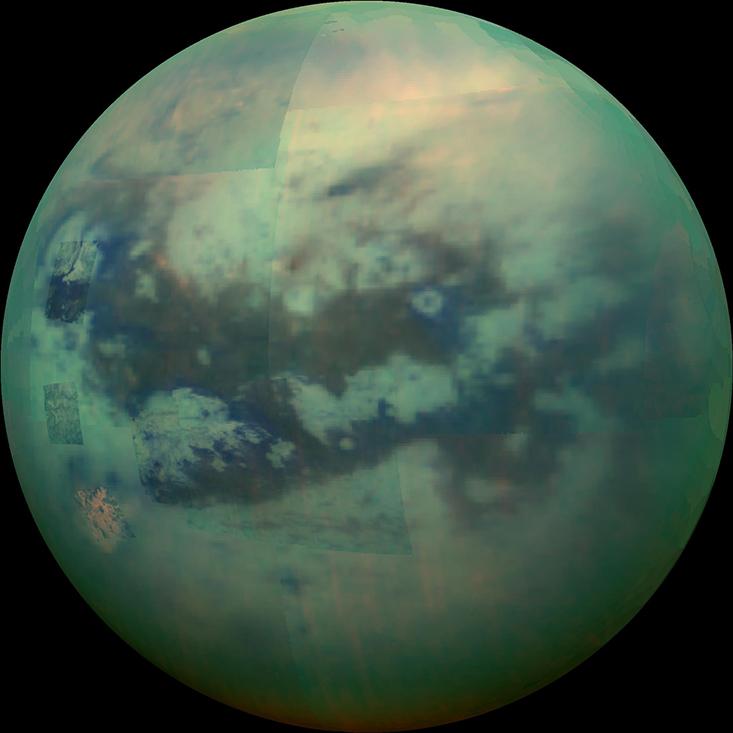
Saturn’s moon may have hidden seas
but here there is only the memory
of her smiling. How the oceanic
dark moved away when she came
near the bed, tucking the covers
around my small body. Moonlight
washing the blankets while I dozed,
her standing outside the door,
dreaming of stars.
Now people have discovered
Titan may have hidden oceans
beneath its ice and my mother
lingers in the hallway until I tuck
her into bed. Sometimes I wait
in the doorway, listen to her breathe
while the stars and moon spin
in the corner of the window;
darkness approaches like the tide.
Come morning I learn there may be
life in those hidden, sunless seas
though my mother sleeps like the dead
in her room. I don’t know if she dreams
because the stars have receded
into blue skies and I am no longer
a child. No longer frightened.
Even on Titan it’s possible the spirit
lingers, concealed though it seems,
spinning in the infinite darkness.
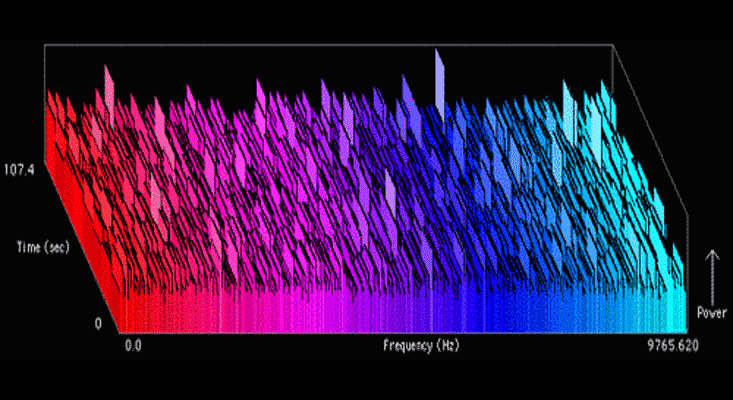
How to search for aliens
At midnight we’d light candles
in the tabernacle and begin
our yearly vigil for the dead.
Mostly I remember the kneeling,
how the vaulted ceiling pressed
the congregation silent until grief
weighted the air. Sometimes I slept
as the incense censer chimed smoke
into strange eddies; often I dreamed
of falling into a vast darkness only to wake
in the pew with tears stepping down my face
as though death had come and gone in the space
of an hour. Even then I knew the spirit shunned
this drama, the artificial quiet shrouding the voice
of god in ritual while outside the planet spun
unperturbed. Four point five billion years
since genesis and the sky still hovers
like a veil between us and space,
wanting to be lifted before the unintelligible
babble dismantles the tower we have
half-built. At Arecibo, signals fall
from the dark like angels dropping messages;
there are miracles in the data waiting for discovery,
contact unrealized despite centuries of squinting
into the heavens. When our vigil ended we would walk
home in the cold, my mother mourning the past
while I tracked the stars that winked between
the street lights, listening for serendipity
in between footsteps. She held my hand so tightly,
perhaps she knew that prayer was too simple:
not enough prime numbers hidden in the signal,
no small man standing on our solar system,
peering out into the universe.
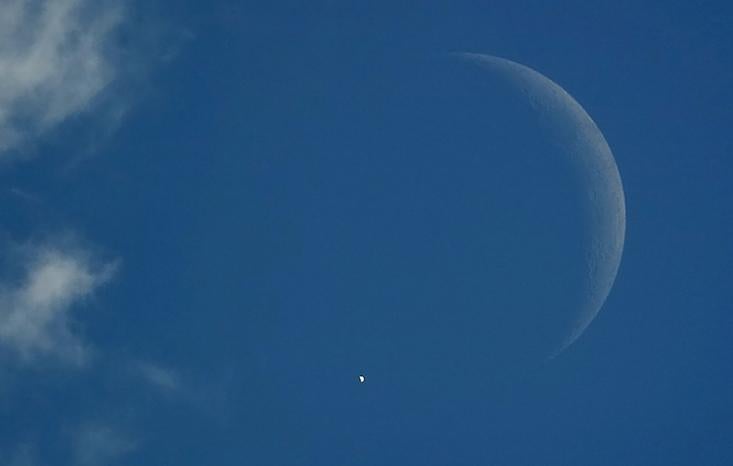
A daylight eclipse of Venus
I couldn’t tell which came first, the moon
or Venus tailing that dusky crescent
like an afterthought. From here,
the tiny eclipse of the planet seemed
fuzzy, not quite real against the enormity
of space and the satellite that hovered
above like an inscrutable god. Later
I read that Venus rose from the sea
centuries ago. Seems she has always
been here, rising at dawn, putting us
to sleep again in the dusk, constant
despite how small she seems against
the moon. I guess she believes
we’ll figure her out eventually as we peer
down into her atmosphere, the Magellan
spacecraft circling her body like a girl
asking her mother for sweets. Perhaps
there’s more to her than the rocky,
volcanic skin she keeps shrouded
so tightly, but I know those secrets
cannot be easily answered so long
as we remain planet-bound, content
to gaze instead of fly.
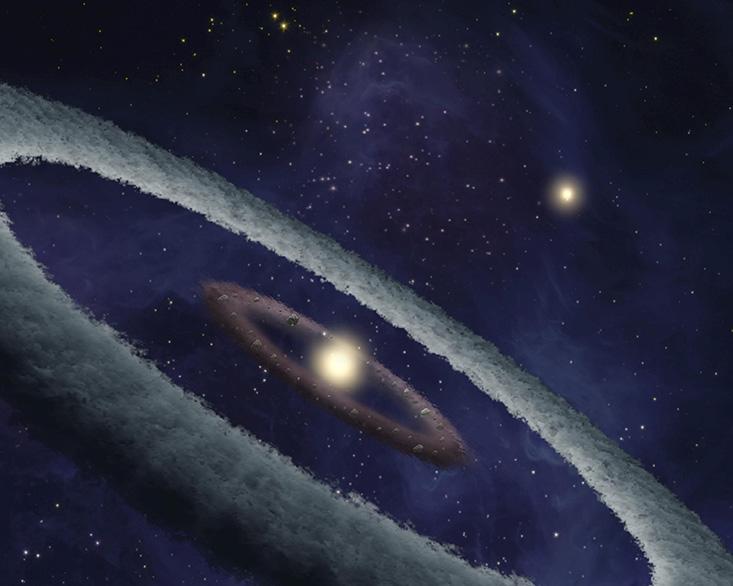
Birth of a planet
You smile when you wake me up.
Planetesimals may be forming
four hundred thirty light years away
but I don’t leave the bed until the tea
you made is ready and sunrise spills
into the house. For verisimilitude
I pretend I am grown and help the boys
choose clean shirts, kiss you goodbye.
Inside I am seventeen and reading about
Earth-like planets and the possibility of life
elsewhere. I have seen an artist’s conception
of a binary star system: dust rings orbiting
the closer sun, planets forming as if right
now is the right moment. Astronomers believe
water may exist in the white outer ring of dust
that looks strangely beautiful in that darkness.
Where anything could happen in a billion years.
Christine Klocek-Lim is an editor, novelist and prize-winning poet who received the 2009 Ellen La Forge Memorial Prize in poetry. Her work has been nominated for the Pushcart Prize and was a finalist for 3 Quarks Daily’s Prize in Arts & Literature, among others.
“Saturn’s moon may have hidden seas” first appeared in the 2009 Ellen La Forge Poetry Prize Annual, and later in Astropoetica. “How to search for aliens” first appeared in the 2009 Ellen La Forge Poetry Prize Annual, and later in Three Quarks Daily. These poems are from the collection Dark Matter (Aldrich Press, 2015).
This article was originally published on Nautilus Cosmos, in November 2016.





























